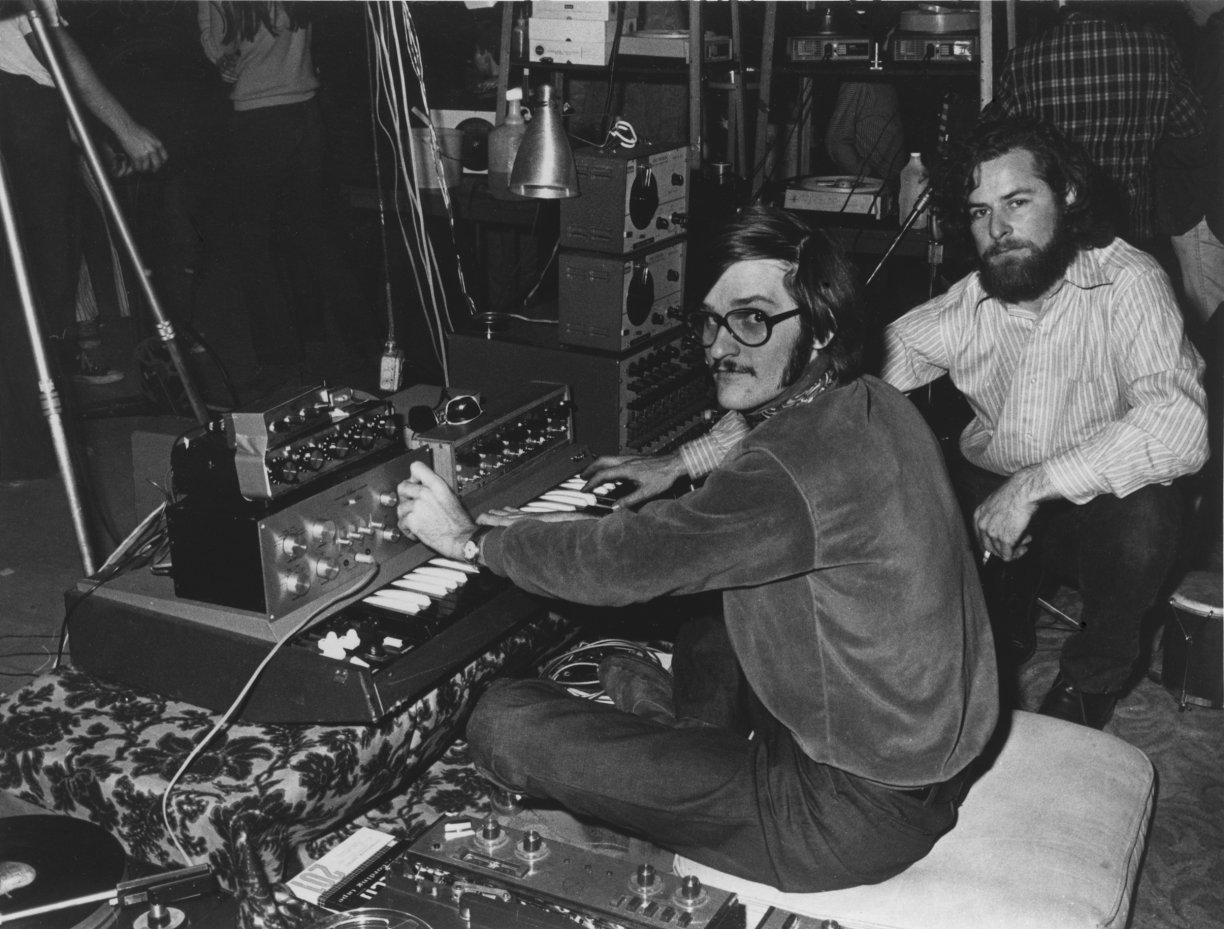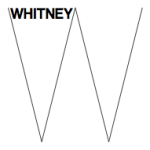Originally written in 1964 for keyboard(s) and/or mallet percussion and later reworked for 2001 for a flexible chamber orchestra, David Rosenboom's Continental Divide articulates harmonic resonances emerging as the opening tritone of the piece slowly finds its pathway to resolution. The original score was included in the book, Pieces, An Anthology, edited and published by Michael Byron. David Rosenboom and William Winant will be joined by Yarn/Wire’s Ian Antonio and Russell Greenberg to perform the original 1964 arrangement.
Although much of David Rosenboom’s work has been collaborative, many of his large-scale collaborative works were not fully documented until recently, and others still await adequate resources. How Much Better If Plymouth Rock Had Landed on the Pilgrims is considered to be one of the most important. Originally written between 1969 and 1971 and performed by David Rosenboom along with many other musicians, including Lynn Newton, Thomas McFaul, Richard Stanley, Michael Slevin, Gerald Shapiro, J. B. Floyd, and Donald Buchla, and meant to be performed in an immersive psychedelic environment, all sections of the piece were not recorded until the late 2000s.
After a 1970 concert at George Washington University the Washington Post wrote: "If there were a device whereby one could plug into the deepest levels of human consciousness, and then translate this input into sound, what we would hear would probably resemble How Much Better if Plymouth Rock Had Landed on the Pilgrims, the radical composition by David Rosenboom. The elemental pulsations of the piece seem to echo not only our fundamental biological cycles, but those innate psychical tides that govern the flux of human thought and feeling. The listener becomes receptive to fantasy and hallucination and instants seem stretched to eternities, Rosenboom's idiom poses a new esthetic . . . against the ascetic, disciplined, puritanical streak that one associates in this country with the Pilgrims, this new music hurls a rejuvenated sensuality and mysticism."
This presentation includes musicians from the original line up for the 2008-2009 recordings with Swapan Chaudhuri (tabla), Aashish Khan (sarode), Vinny Golia (winds), Daniel Rosenboom (trumpet), I Nyoman Wenten and William Winant (Balinese instruments), and David Rosenboom (Disklavier and computer). Visual elements are provided by renowned filmmaker, Maureen Selwood, and legendary light artist Tony Martin.
David Rosenboom (b. 1947) is a composer, performer, conductor, interdisciplinary artist, author and educator known as a pioneer in American experimental music. Since the 1960s David Rosenboom has explored the spontaneous evolution of musical forms, languages for improvisation, new techniques in scoring for ensembles, multi-disciplinary composition and performance, cross-cultural collaborations, performance art and literature, interactive multi-media and new instrument technologies, generative algorithmic systems, art-science research and philosophy, and extended musical interface with the human nervous system. His work is widely distributed and presented around the world. He holds the Richard Seaver Distinguished Chair in Music at CalArts where he is also Dean of The Herb Alpert School of Music. David Rosenboom is a Yamaha Artist.
Swapan Chaudhuri, award-winning Indian classical music phenomenon, has been regularly heard as soloist and with such maestros as Ustad Ali Akbar Khan, Pandit Ravi Shankar, Ustad Vilayat Khan, Pandit Nikhil Banerjee, Ustad Amir Khan, Dr. L. Subramanium, and many others. His recordings with Asha Bhosle and Ali Akbar Khan received Grammy nominations. Beyond classical, he has worked with Stevie Wonder, L. Shankar, Mark O’Connor, John Handy, Alizade, Malenga, Miroslav Tadic, and many others. He is director of percussion at the Ali Akbar College of Music and a member of faculty at the The Herb Alpert School of Music at CalArts.
Aashish Khan, long regarded as a true master of North Indian classical music, also pioneered cross-cultural genres with his Indo-American Jazz-Pop group SHANTI (1969-70). He has continuously developed the music of his family’s heritage, which includes the legendary Acharya Baba Allauddin Khan Sahib, Ustad Ali Akbar Khan, and Smt. Annapurna Devi, received many awards and a Grammy nomination, collaborated with Western musicians, such as George Harrison, Ringo Starr, Eric Clapton, Charles Lloyd, John Handy, Alice Coltrane and others, conducted orchestras, and composed music for film and stage. He is a member of faculty at The Herb Alpert School of Music at CalArts.
Vinny Golia fuses the heritages of jazz, contemporary classical, and world music into a unique style. Highly recognized in publications, he has presented his music internationally and won awards and grants for solos, large ensemble pieces, and multi-disciplinary collaborations. He has performed with Anthony Braxton, Henry Grimes, John Carter, Bobby Bradford, Joelle Leandre, Wadada Leo Smith, Horace Tapscott, John Zorn, Tim Berne, Bertram Turetzky, George Lewis, Barre Phillips, Eugene Chadburne, Peter Kowald, John Bergamo, Misha Mengelberg, Han Bennick, Harry Sparnaay, the Los Angeles Philharmonic, and many others. He a member of faculty at The Herb Alpert School of Music at CalArts.
Daniel Rosenboom (b. 1982) is a creative and prolific trumpet artist, composer, and producer. As a soloist, collaborator, and bandleader, he has been featured on major stages and in festivals around the world. Daniel plays regularly with the Daniel Rosenboom Quintet and several other ensembles, and has twice toured the world as multi-platinum pop singer Josh Groban's trumpet soloist. He also records regularly for motion pictures, television, and video games, and has performed with many of the elite musical groups and orchestras in Los Angeles. In January of 2014, he founded the independent record label, Orenda Records, in an effort to promote his community of like-minded musicians in Los Angeles and beyond. Daniel holds degrees from the Eastman School of Music, UCLA, and California Institute of the Arts, and is a Yamaha Performing Artist.
I Nyoman Wenten, one of Bali's most accomplished and versatile dancers and musicians, is known for both traditional Indonesian music and dance and for creative East-West fusions. He has collaborated with many renowned artists, including Morton Subotnick, Elaine Barkin, George Lewis, Dr. L. Subramaniam, Sardono W. Kusumo, Linda Sohl-Donnal Elison, and others. He performs and lectures worldwide and is producer and musical consultant for a highly regarded series of gamelan recordings on CMP Records. Celebrated as a teacher and performer, he is a member of faculty at The Herb Alpert School of Music at CalArts.
William Winant, a multi-faceted percussion artist with over 130 recordings, has collaborated with John Cage, Iannis Xenakis, Anthony Braxton, James Tenney, Cecil Taylor, George Lewis, Steve Reich, Frederic Rzewski, Joan LaBarbara, Oingo Boingo, Kronos Quartet, Sonic Youth, Mr. Bungle, Yo-Yo Ma, Mark Morris, Merce Cunningham, San Francisco Contemporary Music Players, and the Abel-Steinberg-Winant Trio. Composers who have written for him include John Cage, Lou Harrison, John Zorn, Alvin Curran, Chris Brown, David Rosenboom, Larry Polansky, Gordon Mumma, Alvin Lucier, Terry Riley, Fred Frith, and Wadada Leo Smith. He teaches at Mills College and the University of California at Santa Cruz.
Maureen Selwood is a visual artist who works with hand-drawn animation for film, installation and performance. Recent examples of her work include the digital animated projections for Sardono Dance Theater and Jennifer Tipton: Rain Coloring Forest (REDCAT, 2010), collaborating with composer, David Rosenboom, to create a film for performance for How Much Better if Plymouth Rock Had Landed on the Pilgrims, (Section VII, Impression), which was first presented at the Indonesian Arts Festival, Jakarta (2009), and As You Desire Me, a multi-media installation piece made with an Individual Artist’s Fellowship from C.O.L.A. (Los Angeles, 2009). Her work has been widely shown and exhibited around the world, including Quaderns Animats at Arteko Gallery in Spain (2009), Tevereterno (Rome, 2006), River Festival (New York, 2008), Frac Picardie, (France, 2008), American Academy in Rome (2003), MAK Center for Art and Architecture, (Los Angeles, 2001) and many other places. She has been the recipient of numerous grants and awards and is a member of faculty at the School of Film/Video at CalArts.
Tony Martin’s fifty years of multimedia performances and installations join pure light with images from his continuous practice of drawing, painting, and filming. The spontaneous combines with the planned in free-form light projection and video that has often included sensor-activated electronics to allow performer and viewer participation. Martin’s seminal visual compositions and multi-disciplinary pieces began in the 1960’s San Francisco era of experimentation, and the “Downtown Artist” movement in NYC. He has collaborated with major performing artists, such as the Anna Halprin Dance Company, Morton Subotnick, David Tudor, the Merce Cunningham Dance Company, Pauline Oliveros, and created a light system for Experiments in Art and Technology’s Pepsi Pavilion at Expo 70, Osaka. In 1993, Martin helped co-found The Painting Center, with the aim of providing exhibition space to both emerging and mature painters pursuing different formal directions. Martin performed his light compositions with David Rosenboom’s How Much Better If Plymouth Rock Had Landed On The Pilgrims in 1969-1970 as part of a series called The Electric Ear, which originated in New York’s Electric Circus.




